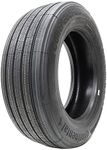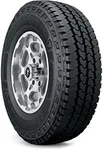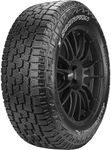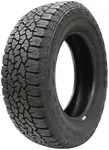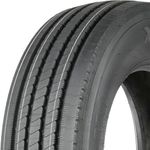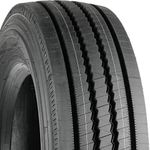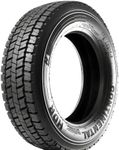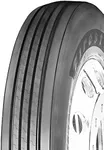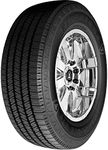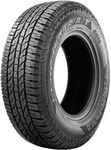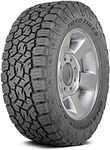Buying Guide for the Best Commercial Truck Tires
Choosing the right commercial truck tires is crucial for ensuring safety, performance, and cost-efficiency. The right tires can improve fuel efficiency, provide better traction, and last longer, which is essential for commercial operations. When selecting commercial truck tires, it's important to consider various specifications that will match your specific needs and the conditions in which the truck will be operating.Tire SizeTire size is a critical specification that includes the width, aspect ratio, and diameter of the tire. It is important because it affects the truck's handling, load-carrying capacity, and overall performance. Tire sizes are usually indicated in a series of numbers and letters (e.g., 295/75R22.5). To choose the right size, refer to the truck manufacturer's recommendations and consider the type of loads you will be carrying. Larger tires may offer better stability and load capacity, while smaller tires might be more fuel-efficient.
Load RatingThe load rating indicates the maximum weight a tire can safely carry. This is crucial for commercial trucks that often transport heavy loads. The load rating is usually represented by a number and a letter (e.g., 123L). Higher numbers indicate a higher load-carrying capacity. To choose the right load rating, consider the maximum weight your truck will be carrying, including the cargo. Ensure the load rating of the tires matches or exceeds this weight to maintain safety and performance.
Tread PatternThe tread pattern of a tire affects its traction, handling, and wear characteristics. There are different types of tread patterns, such as ribbed, lug, and block patterns. Ribbed patterns are ideal for highway driving and offer good fuel efficiency, while lug patterns provide better traction on off-road or muddy surfaces. Block patterns are versatile and can be used in various conditions. Choose a tread pattern based on the primary driving conditions your truck will encounter. For example, if you mostly drive on highways, a ribbed pattern may be best, while off-road conditions may require a lug pattern.
Tread DepthTread depth is the measurement of the depth of the tire's tread and is important for traction and longevity. Deeper treads provide better grip, especially in wet or snowy conditions, and can last longer. Tread depth is measured in 32nds of an inch. New commercial truck tires typically have a tread depth of around 18/32 to 32/32 inches. To choose the right tread depth, consider the driving conditions and the type of loads you carry. Deeper treads are better for challenging conditions, while shallower treads may be sufficient for regular highway driving.
Durability and Ply RatingDurability and ply rating refer to the tire's ability to withstand wear and tear and its overall strength. Ply rating indicates the number of layers of rubber-coated fabric in the tire, which affects its durability and load-carrying capacity. Higher ply ratings mean stronger tires that can handle heavier loads and rougher conditions. To choose the right durability and ply rating, consider the type of terrain and the weight of the loads your truck will be carrying. For heavy-duty applications, opt for tires with higher ply ratings.
Fuel EfficiencyFuel efficiency in tires is determined by their rolling resistance, which is the energy lost when the tire rolls. Lower rolling resistance means better fuel efficiency, which can lead to cost savings over time. Tires designed for fuel efficiency often have special tread patterns and rubber compounds. To choose the right tires for fuel efficiency, look for those labeled as low rolling resistance or fuel-efficient. Consider the balance between fuel savings and other performance factors like traction and durability.
Weather PerformanceWeather performance refers to how well the tires perform in different weather conditions, such as rain, snow, or extreme heat. Some tires are designed specifically for certain weather conditions, like all-season, winter, or summer tires. All-season tires offer a balance of performance in various conditions, while winter tires provide better traction in snow and ice, and summer tires perform well in hot conditions. To choose the right weather performance, consider the climate and weather conditions in the areas where your truck will be operating. Select tires that are designed to handle those specific conditions effectively.
